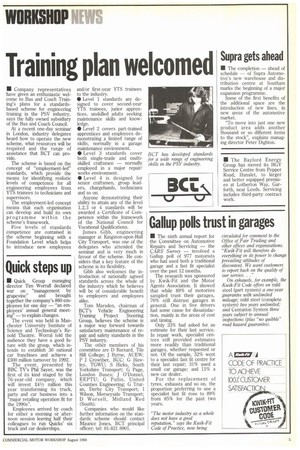Training plan welcomed
Page 47

If you've noticed an error in this article please click here to report it so we can fix it.
• Company representatives have given an enthusiastic welcome to Bus and Coach Training's plans for a standardsbased scheme for engineering training in the PSV industry, says the fully owned subsidiary of the Bus and Coach Council.
At a recent one-day seminar in London, industry delegates heard how to operate the new scheme, what resources will be required and the range of assistance that BCT can provide.
The scheme is based on the concept of "employment-led" standards, which provide the means for identifying realistic levels of competence for all engineering employees from YTS trainees to technicians and supervisors.
The employment-led concept means that each organisation can develop and build its own programme within the scheme's framework.
Five levels of standards competence are contained in the scheme beginning with a Foundation Level which helps to introduce new employees and/or first-year YTS trainees to the industry.
• Level 1 standards are designed to cover second-year YTS trainees, junior apprentices, unskilled adults seeking maintenance skills and knowledge.
• Level 2 covers part-trained apprentices and employees de monstrating a limited range of skills, normally in a garage maintenance environment.
• Level 3 standards cover both single-trade and multi skilled craftsmen — normally employed in a major repair/ works environment.
• Level 4 is designed for senior craftsmen, group leaders, chargehands, technicians and so on.
Anyone demonstrating their ability to attain any of the level 1,2,3 or 4 standards will be awarded a Certificate of Competence within the framework of the National Council for Vocational Qualifications.
James Gibb, engineering manager at Kingston-upon-Hull City Transport, was one of the delegates who attended the seminar and is very much in favour of the scheme. He considers that a key feature of the scheme is its flexibility.
Gibb also welcomes the introduction of nationally agreed standards across the whole of the industry which he believes will be of considerable benefit to employers and employees alike.
Tom Marsden, chairman of BCT's Vehicle Engineering Training Project Steering Group, believes the scheme is a major way forward towards satisfactory maintenance of repair and safety standards in the PSV industry.
The other members of his committee are D Barnard, Tile Hilt College; J Byrne, AUEW; P J Crowther, BCC; G Hawley, TGWU; S Hicks, South Yorkshire Transport; G Page, London Buses; J O'Donnel, EEPTU; G Pullin, United Counties Engineering; G Truran, Derby City Transport; I Wilson, Merseyside Transport; D Worsell, Midland Red (South).
Companies who would like further information on the standards scheme should contact Maurice Jones, BCT principal officer; tel: 01-831 8901.








































































